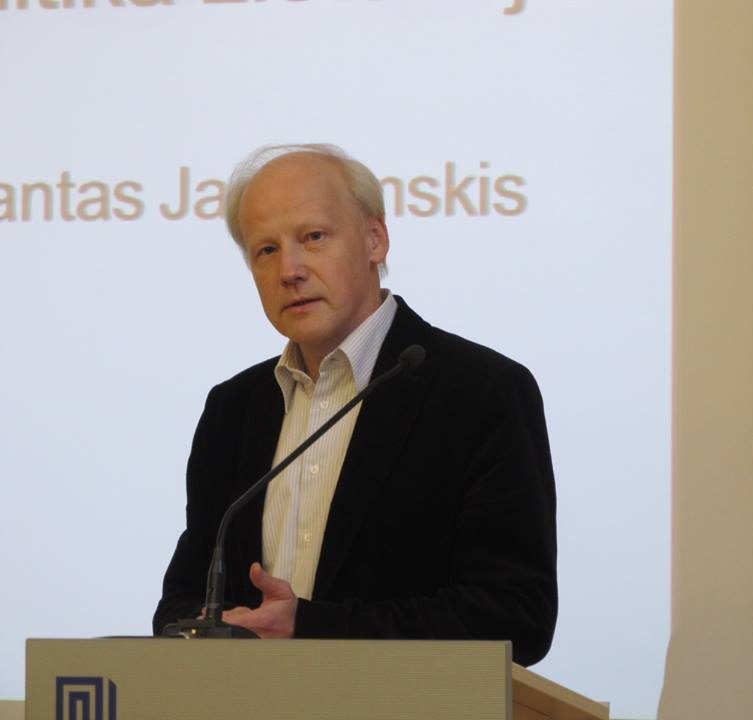
Dr. Deimantas Jastramskis
Professor
Additional info
deimantas.jastramskis@kf.vu.lt
Deimantas Jastramskis graduated from engineering at Kaunas University of Technology and integrated psychology studies at Vilnius University. In 2010 Deimantas Jastramskis defended his doctoral thesis “Connection between the ownership structure of media organization and partiality of news”.
Deimantas Jastramskis is a member of media research association of Baltic states, a member of editorial board of journal “Informacijos mokslai”, he also participates in a section for Communication Law and Policy of European Communication Research and Education Association.
Research projects
- Project of European University Institute “Media Pluralism Monitor MPM2020”, 2020–2021. Member of national research group, project researcher.
- Project of Research Council of Lithuania “Media Concentration and it Regulation in Lithuania”. 2020–2021. Nr. P-REP-20-10. Project leader, principal investigator.
- Project of The European Commission Directorate‑General for Communications Networks, Content and Technology “SMART 2018/0066 – Part D: Study on the implementation of the new provisions in the revised Audiovisual Media Services Directive (AVMSD)”, 2020. National expert.
- “Erasmus+” project “Media and Information Literacy&Innovative Teaching Methods Laboratory”, 2017–2020. 2017-1-LV01-KA203-035429. Project leader and researcher.
- “Nordplus Horizontal” project “Connecting the Nordic and Baltic region for achieving excellence in cross-media innovation and journalism education”. June 2016 – May 2017. NPHZ-2016/10021. Project partner.
- Project of European Commission Directorate-General for Home Affairs, Programme “Prevention of and Fight against Crime” “Evidence-Based Action Against Corruption: Project of Systems of European Resilience to Corruption”, 2011–2012. Project researcher.
Selected conference papers
- Multiple streams in the Lithuanian media policy. 8th ECREA European Communication Conference (Braga, Portugal, online). 8 September, 2021.
- Evolution of political influence on the Lithuanian national radio and television. 2019 IAMCR Conference „Communication, Technology & Human Dignity: Disputed Rights, Contested Truths“. School of Communication, UCM, 7-11 July, 2019, Madrid, Spain.
- Denationalization and agencification of net neutrality policy in Lithuania. 7th European Communication Conference – Centres and Peripheries: Communication, Research, Translation. ECREA, USI Università della Svizzera italiana, Lugano, 2018.
- Changing Lithuanian media system in the global network environment. The Baltic states at 99: Past, Present and Future. The 12th Conference on Baltic Studies in Europe. University of Latvia, 2017.
- Media freedom in Lithuania: economic dimension. Media and Communication studies: bridging disciplines, bridging countries – 9th Central and Eastern European Communication Conference. ECREA CEE Network, University of Tartu, 2016.
Courses taught
Media and Politics
Research interests
Media politics
Media structure
Media systems
Publications
Jastramskis, D. Žiniasklaidos politika Lietuvoje. Vilnius: Vilniaus universiteto leidykla, 2019. 232 p.
Kõuts-Klemm, R., Rožukalne, A., Jastramskis, D. (in press). Resilience of the national media systems: Baltic media in the global network environment. Journal of Baltic Studies.
Šuminas, A., Jastramskis, D. The importance of media literacy education: How Lithuanian students evaluate online news content credibility. Central European journal of communication. 2020, t. 13, Nr. 2(26), p. 230-248. https://doi.org/10.19195/1899-5101.13.2(26).5
Jastramskis, D. The denationalization and agencification of net neutrality policy in Lithuania. Medijska istraživanja. 2019, t. 25, Nr. 2, p. 29-43. https://doi.org/10.22572/mi.25.2.2
Jastramskis, D. Politinė įtaka Lietuvos nacionalinio radijo ir televizijos vadybai ir finansavimui: kaita ir pasekmės. Politologija. 2018, t. 2, Nr. 90, p. 5-33. https://doi.org/10.15388/Polit.2018.90.11922
Jastramskis, D. Reduction of liberalism in Lithuanian media policy. Central European journal of communication. 2016, t. 9, Nr. 2 (17), p. 164-179. https://doi.org/10.19195/1899-5101.9.2(17).2







